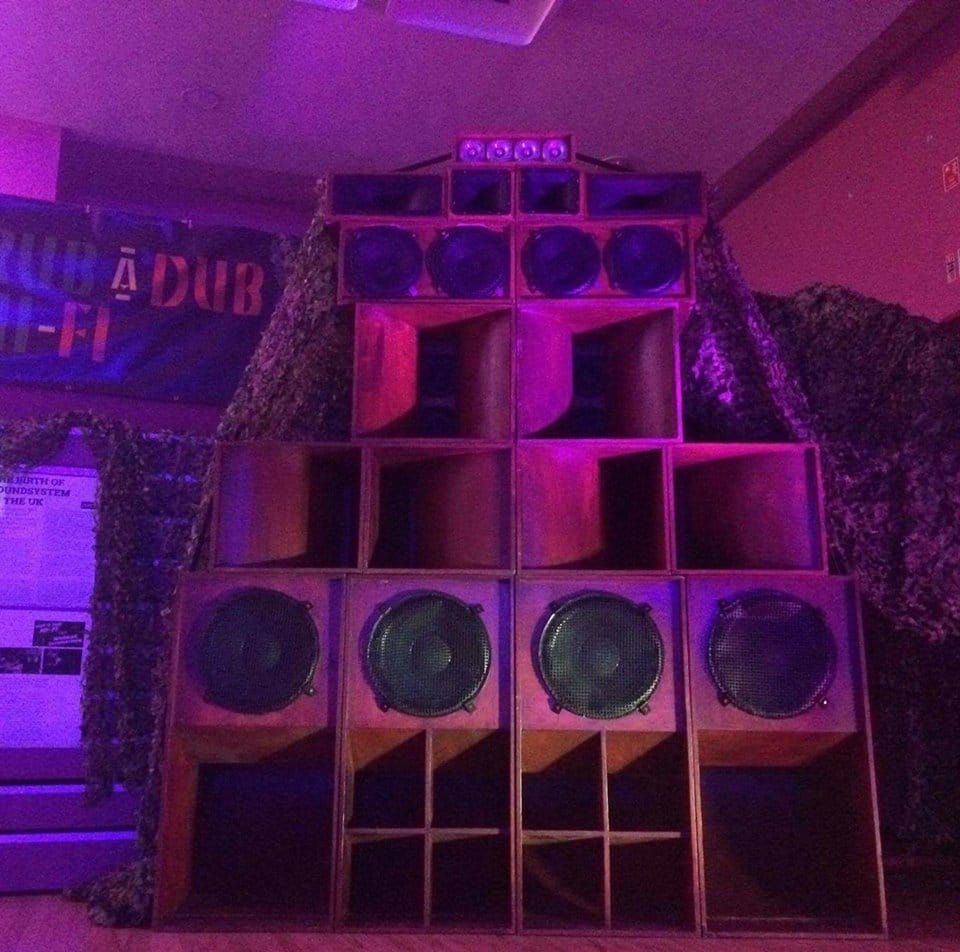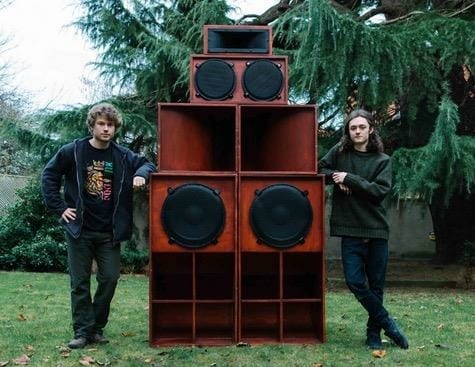What’s the best way to tell area residents about plans for a new asylum shelter nearby?
The government should tell communities directly about plans for new asylum shelters, some activists and politicians say.
Two reggae fans built themselves a massive Jamaican-style sound system. Problem is, it’s so big, and so loud, they have trouble finding a venue for it in Dublin.

I?arla Ó Muirthile admits that he wasn’t exactly adept in construction before embarking on this major project.
“Iarla, you had never even used a screw gun before,” says his bandmate Charlie Beresford with a smile, sat at a table near the bar in Wigwam on Middle Abbey Street, where the music is distant enough for conversation.
Three years ago, Ó Muirthile and Beresford teamed up to make Rub A Dub Hi-Fi. Together, they play a full range of reggae “all the way from rocksteady to tunes that haven’t even been released yet”, says Ó Muirthile.
They rented and borrowed equipment for a couple of years, a hassle made tougher by the fact that they weren’t earning money from gigs.
So last year, they decided to build their own sound system, the sophisticated DJ set which goes along with a live MC, and special effects, and would let them mix records.

Now complete, their sound system has 17 speakers and several amps. Like others, it is made of stacks of speakers that point towards the audience, surrounding them with sound.
“It’s better than some of the ones you buy. It’s built to what we want to be,” says Beresford, a 22-year-old music student with shoulder-length brown hair.
Commercial systems flatten the sound, and songs are altered to fit with the range that they can handle. “When they are finishing off a tune, they will shave off the bottom and the top,” says Ó Muirthile, who used to be a chef and is now training to be a primary school teacher.
Their system, though? “You could be playing a record that is 40 years old and making it alive again,” says Beresford.
They had a little help with the building work. Their friend’s dad Clive Davies – a carpenter and a reggae fan – helped a lot. He built the first two boxes for them. They picked up how to do it from him and took over the rest of the construction.
They also got help from lecturers at the Institute of Art Design and Technology, where Beresford was studying creative music production. “The work got better gradually,” he says.
The preamplifier is always hand-built in a reggae sound system. So it took a trip to Hackney in London to collect theirs, says Ó Muirthile. The guy he was buying it from had made it himself and refused to put it in the post.
Sound-system culture started in Jamaica in the 1950s, and has spread reggae and dancehall music all around the world, says Julian Henriques, a professor at Goldsmiths, University of London, and the author of Sonic Bodies.
In Jamaica, “the community dances are literally out on the street, with the speaker boxes on each side”, he says. Roads are closed off to traffic and anybody can join in for free.
“Its very, very beautiful,” he says. “It’s a vibe, like.” He pauses. “You just have to experience it.”
Different sound systems have dedicated followings and engage in battles against each other, known as clashes. These are judged by the cheers of the audience, says Henriques.
“You’ve got the atmosphere. You are outside. You’ve got the speakers facing into the crowd,” he says. “Now how you are going to win the clash is by building the vibe.”
The culture has seeped into mainstream music, too. It’s there in the special effects used by popular recording artists like Damian Marley, says Henriques. “He is bringing the vibe from the sound system culture into the recording studio.”
But to create a vibe, to build up a large following, to fill a space or a street with sound, there needs to be a large space or a street to play in.

That’s an obstacle that Ó Muirthile and Beresford are struggling to overcome.
Back in Wigwam in Dublin, Ó Muirthile points to the back of the bar which, he says, used to be a stage when it was Twisted Pepper.
The current management is letting them use the basement of the bar for their upcoming gigs, the first of which is scheduled for early next month, with the new sound system. They’re grateful.
But with space for 80 people, it isn’t big enough to hold the 150 fans that they think might come. The ceiling is low and it will be hard to fit the large stack of speakers in too, says Ó Muirthile.
When Rub A Dub Hi-Fi started three years ago, there weren’t any other active sound systems in Dublin, says Ó Muirthile. (Aside from Worries Outer-National who ran a night in Sweeney’s, but had to leave some of their equipment at home.)
The pair were reggae fans, though, so they rented a sound system and ran their first night, “Rub A Dub in the Pub” in Dún Laoghaire.
The first gig “was a total disaster”, says Ó Muirthile. The owner who had agreed to it all wasn’t there, and the bar manager didn’t like the look of the crowd.
“He said, ‘What the hell do you think you are doing with a bunch of hippies in here?’” he recalls. “Then he pulled the plug at 11 o’clock.” They were supposed to play until 1am.
Despite the early finish, 150 people had turned up. Since then they have played at numerous festivals, but have struggled to find appropriate venues in the city.
They usually demonstrate the volume so the bar owner knows what he is signing up to and can decide whether to go ahead. Ó Muirthile recalls approaching a Greek restaurant, where the owner “is convinced that his little speaker is louder than our sound system”. After he heard the volume the system could reach, he backed out.
The City of Dublin Working Men’s Club, off Capel Street, welcomed them in and they never complained about the noise, says Ó Muirthile. But it is an old building and the sound system shook the walls. Dust fell from the ceiling. In the end, they stopped as the light-fittings were shaking.
Estate agents, art galleries, other cultural spaces – they’ve asked them all and been disappointed, says Ó Muirthile.
Some seem to dismiss them as just wanting to have a party, which annoys him. “Well, no, actually we are very serious about what we do,” he says. “It’s about bringing people together in a positive experience. It is anti-racist, anti-fascist. It is about unity and love.”
Galleries and cultural spaces should be open-minded about what art is, he says. In Jamaica, sound-system dances happen on the street. In the UK, they’re often in community halls. In many European cities, they’re in cultural centres. It means the music can be cheap, or free.
But in Ireland you need to have a dance licence, which is unfair, says Ó Muirthile.
So going to Copper Face Jacks nightclub and getting smashed until 5am is fine, he says. “But we want to do something that is a very positive and uplifting experience for people we are not allowed.”
Says Beresford: “Why do they have to make money off it?”
“We want people to experience a journey of music,” says Ó Muirthile. “Whenever anyone does come to the gigs, they are blown away by the energy because it is something different.”